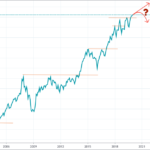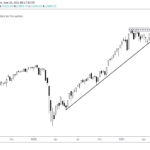“Never depend on a single income. Make Investments to create a second source.”
Warren Buffett.
Many people ask me whether they should become a full-time trader. Should they start trading for a living?
A lot of people have this fantasy of trading on the beach and making millions. Beware! You are in for a disappointment!
Sorry if I crushed your dreams but being a full-time trader is a sure-fire way to disaster. Now those who are preaching trading for living will give out 1000 reasons to trade on your own.
But we must do some reality checks before becoming a full-time trader.
Grit alone will not make you a successful trader.
We are hardwired to do challenging things. It gives us a sense of achievement and a little bit of ego boost. We are always taught to never give up if we want to be successful. And that’s why millions of people start trading full time believing, “Hum Honge Kamayaab”.
Warren Buffet says that avoidance of ‘Grit’ is the path to success. He writes in Wall Street Journal opinion piece that if hypothetically the economy was a sports-based one, he would have been ‘a flop’.
…You could supply me with the world’s best instruction, and I could endlessly strive to improve my skills. But, alas, on the gridiron or basketball court I would never command even a minimum wage.”
Just as Buffett would have been a disaster at sports, many super successful sportsmen almost certainly can’t allocate capital as good as Buffett does. They pursued what amplified their talents.
The point I’m trying to make is if you’re very talented, well-capitalized and can sustain the wear & tear of trading full time, by all means, do it. But most people can’t.
There are many who will glorify trading. Some of them even say that trading is the toughest job in the world! If it’s the toughest job & your chances of success are very less, why would you even want to do it?
Charlie Munger, a long-time partner of Warren Buffett, says,
“All I want to know is where I’m going to die so I’ll never go there.”
You can’t create wealth through trading!
If trading is so difficult then why the hell am I writing on this blog about trading? Isn’t it contradictory?
Yes, it is & I get it!
What I am trying to say is full-time trading is difficult for most people. Trading can be stressful, frustrating & gut-wrenching.
Also, most people misinterpret full-time trading as a way to build wealth. Nothing can be farther from the truth. Its primary objective is to earn an income. You cant create wealth through full-time trading because it’s very difficult to compound your gains over time.
Rakesh Jhunjhuwala has often said that he trades in markets to accumulate capital to invest for the very long term.
I am not saying you can’t make money through full-time trading. There are always exceptions to rule. But if you observe them, they spent at least 7 hours a day watching every tick and countless charts. Still, there is no certainty that you will be profitable.
So what should you do?
The cardinal rule of growing your wealth faster is to have multiple streams of income. I suggest trading on the side. Create a primary source of income from your job or business. This will give you a strong foundation to follow through your trading system.
Having another source of income is beneficial psychologically as well as financially. Let’s take an example of two traders JAI & VEERU. Both the traders start with an equal capital of say Rs. 10 lakhs.

Let’s assume that they have achieved the following returns over the last 5 years.
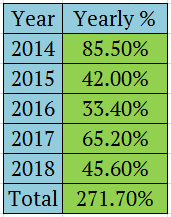
The above sets of numbers are excellent. Only exceptional traders are able to achieve returns like the above. Here for our illustration purposes, we will assume that both Jai & Veeru are superb traders.
JAI:
Jai is a typical full-time trader who has to rely on the profits from the trading system for his survival. Jai estimates that he needs at least Rs. 30000/ month or 3.6 lakhs annually as living expenses & rest he can invest back into trading capital. Let’s see how he fares.
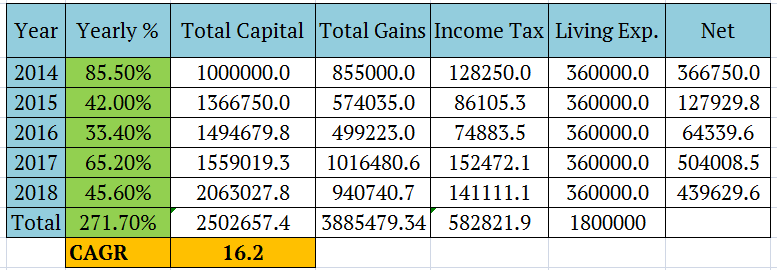
Even after paying himself 3.6 lakhs & income tax, Jai is able to generate CAGR of 16.2 % which is reasonable if not extraordinary.
VEERU:
Veeru, on the other hand, is smart as he keeps his day job that he enjoys & trades on the side. Although he has been able to generate very good returns, he treats his job as a hedge against any down years. Now that he has a job which pays his monthly living expenses, he need not withdraw his profits and let them compound. Let’s see how Veeru fares after 5 years…
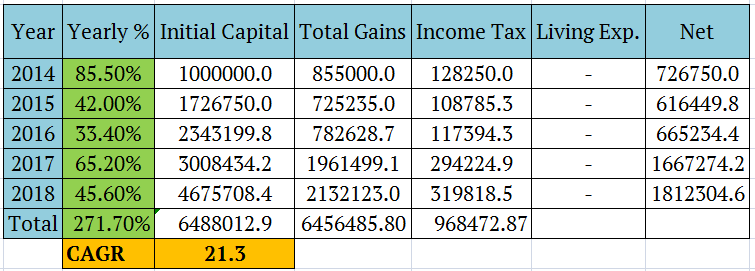
Veeru has done exceedingly well. He has been able to generate 21.3 % CAGR on his capital outperforming Jai by a wide margin. All these returns with less stress & good social life at the job.
As you can see having another source of income yields much better outcomes. In his book, “Rich Habits, Poor Habits”, co-author Tom Corly studied 233 wealthy individuals and 128 lower-earning individuals. He found that over 65 % of the wealthy have at least 3 sources of income. This is one of the few unknown secrets of wealthy investors or businessmen.
Some important points for you to keep in mind looking at the above example of Jai & Veeru…
- Let’s be real here. These are exceptional returns that very few traders can achieve. Even most successful traders/ investors are also not immune to down years, drawdowns or underperformance. When you are going through a period of drawdown, it becomes extremely difficult to execute the strategy.
- For Jai to match Veeru’s performance, he would require at least Rs. 20 lakhs as starting capital as against Rs. 10 lakhs. Most traders are undercapitalized. For them to cover their living expenses & reinvesting profits, they usually have to go for higher leverage. Excessive leverage kills even the biggest of corporations & investors.
- For example, if you have Rs. 10 lakhs as your only savings & you go through a drawdown of say 20 % which is quite common in markets. Now you only have Rs. 8 Lakhs left out of your total savings. Under the circumstance, you will either take up huge leverage or position to make up for the loss or be very conservative & miss out on many profitable opportunities.
- While the living expenses are reasonable enough, it’s still 36 % of your starting capital which is difficult to overcome with Rs. 10 lakhs. Also, we are not considering any effect of inflation here.
- Jai has to go through a lot of stress to achieve the above returns. While Veeru is able to compound his capital at a much faster rate & with less stress as his job provides a hedge against any lean years.
- It has been my experience that the lesser time you’re tracking the market, the more your chances of success. If you constantly check the prices of your positions, you will commit emotional mistakes which can be very costly.
- Many people will give you all the rosy pictures of being a full-time trader but as a matter of fact, they are also selling trading courses, books or other services to generate additional income. I am not saying there’s anything wrong with that. If you have developed some trading skills which helped you to make money, you can definitely teach others. Some of the traders earn more from selling courses & other services than trading itself.
So if you want to be a successful trader or investor, it is always a good idea to have another source of income so that you can execute the strategy consistently & grow your wealth faster.
Now the question is how do you find such a trading system which you can trade side by side with your job or business. Well, the DYR Hybrid Strategy that we follow requires just 10-15 minutes of your time daily. You don’t have to be glued to the computer screen watching every tick! You can just place the trades and continue with your job or business.


